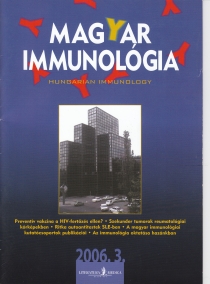The eLitMed.hu medical portal uses computer cookies for convenient operation. Detailed information can be found in the Cookie-policy.
Hungarian Immunology - 2006;5(03)
Content
[Malignancies in systemic autoimmune diseases and due to immunosuppressive therapy]
[There is an increased risk for secondary tumor development in some, mostly systemic, rheumatic diseases. Among immunosuppressive agents used in antirheumatic therapy, there is enough data available to support that cyclophosphamide and azathioprine are oncogenic. However, the role of methotrexate, cyclosporine A and anti-TNF agents in tumorigenesis is rather controversial. Authors describe those systemic diseases and immunosuppressive drugs, which may increase the development of malignancies.]
[Detection of rare phospholipid/co-factor antibodies in lupus patients]
[OBJECTIVE - Was to detect the rare phospholipid/ co-factor autoantibodies in lupus patients. PATIENTS AND METHODS - In the present study, besides anti-cardiolipin and anti-β2-glycoprotein I, antibodies directed against phosphatidil-serine, protrombin and annexinV were measured by commercial ELISA kits in 85 randomly selected lupus patients, 14 of whom met the criteria of antiphospholipid syndrome. Corralations were determined between the presence and concentration of rare antiphospholipids and those included in the diagnostic criteria of antiphospholid syndrome, as well as with clinical thrombotic manifestations. RESULTS - Anti-cardiolipin IgG was positive in 14 patients, aCL IgM in eight, anti-β2GPI IgG in four and IgM in five patients. Lupus anticoagulant was detected in nine cases. Seven patients were positive for anti-phosphatidilserine IgG, nine for aPS IgM, anti-protrombin IgG was positive in nine cases. Antiprotrombin IgM and anti-annexinV were negative in all patients. Correlation was found between antiphosphatidilserine and anti-cardiolipin antibodies. The frequency and the concentration of rare antiphospholipid/ co-factor antibodies were higher in patients with secondray antiphospholipid syndrome. The presence of such rare antiphospholipid antibodies cumulated in patients with antiphospholipid syndrome. Their presence increased the frequency of thrombotic events in the entire study population, furthermore in those positive for lupus anticoagulant or anti-cardiolipin. CONCLUSIONS - The rare anti-phospholipid/cofactor antibodies were found in 12% of an unselected cohort of lupus patients. Their presence was more frequent in patients with secondary antiphospholipid syndrome, and further increased the risk of thrombotic complications.]
1.
Clinical Neuroscience
[Headache registry in Szeged: Experiences regarding to migraine patients]2.
Clinical Neuroscience
[The new target population of stroke awareness campaign: Kindergarten students ]3.
Clinical Neuroscience
Is there any difference in mortality rates of atrial fibrillation detected before or after ischemic stroke?4.
Clinical Neuroscience
Factors influencing the level of stigma in Parkinson’s disease in western Turkey5.
Clinical Neuroscience
[The effects of demographic and clinical factors on the severity of poststroke aphasia]1.
2.
Clinical Oncology
[Pancreatic cancer: ESMO Clinical Practice Guideline for diagnosis, treatment and follow-up]3.
Clinical Oncology
[Pharmacovigilance landscape – Lessons from the past and opportunities for future]4.
5.





